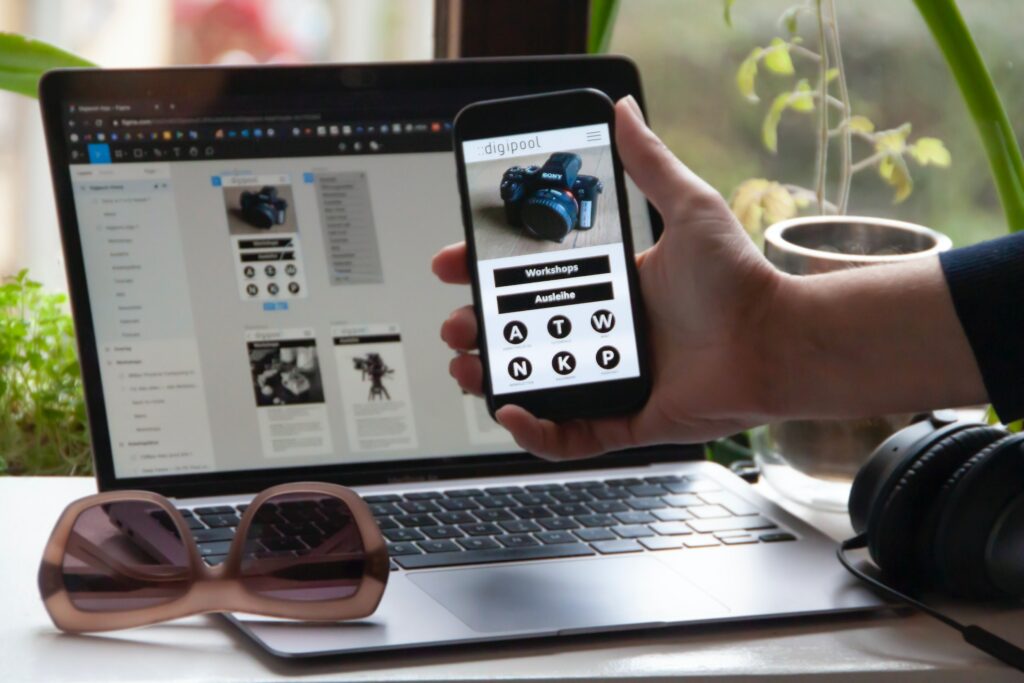If you’re here, you’re likely a business owner who’s wondering whether you should commission a custom app or use an already existing generic product to solve your business needs. In this guide, we take an in-depth look at custom mobile app development and some of the main benefits to help you decide if it’s right for you.
Let’s dive in!
Short on time? Jump to… ⬇️
Custom mobile app development is the process of creating unique, tailor-made applications designed to meet the specific requirements and preferences of an individual client or business.
Investing in building a customized app has many benefits over buying or subscribing to a generic app. Firstly, because the custom app is a bespoke solution, it’s unique, which helps to differentiate your business from competitors. Secondly, it fits your specific goals, needs and business situation, which means it is more relevant, value-adding and can possibly save on costs later on.
Here are some examples of custom mobile app projects:

One of the primary motivations for investing in custom mobile app development is the ability to create a personalized, unique user experience that’s specific to your business.
By developing an app tailored to your target audience’s needs and preferences, you can increase user engagement and satisfaction, ultimately leading to higher user retention rates and improved business results.
Custom mobile app development allows businesses to build scalable and flexible solutions that can adapt to their evolving needs.
This means that as your business grows or as market demands change, your app can be easily modified and expanded to accommodate these changes, saving you time and resources in the long run.
With a custom mobile app, businesses are not dependent on external players but have more of a direct role on how secure the app is. They can implement adapted security measures and protocols tailored to potential associated risks.
For example, the interface can be safer and harder for potential hackers to target because it is bespoke or because owners have applied additional measures such as data encryption, or customized authentication and authorization.
It stands for End User License Agreement and is essential for protecting your app.
It’s a no-brainer. You will be able to achieve competitive advantage and be relevant in your market with a custom mobile app, over a generic app.
Develop a unique and innovative solution specifically for your business purpose, so you can stand out from the crowd and attract more customers.
✅ Define Your Ideal App User: before starting the development process, it’s essential to define your target audience clearly. Who will be using your app? What are their needs and preferences? This will give you important insights in how you can create an engaging and satisfying experience.
💡 Want to develop an app for kids? There are some specific requirements you need to be aware of.
✅ Develop a Prototype: creating a prototype allows you to test and refine your app’s functionality and design before moving on to full-scale development. This can save you time and resources by identifying potential issues early on and ensuring a smoother development process.
It stands for End User License Agreement and is essential for protecting your app.
✅ Consider Costs: developing a custom mobile app can be a significant investment, so it’s essential to carefully consider costs and allocate resources accordingly. Keep in mind that while custom Android app development might be more affordable initially, you may need to invest in additional resources for iOS development since your target audience probably uses both platforms.
The cost of development from an agency or developer can vary significantly based on things like the complexity of the app, the platform(s) it will be developed for (iOS, Android, or both), the geographic location of the development team, and the level of expertise and experience of the developers.
However, here are some general cost estimates:
💡 Keep in mind other ongoing costs such as app maintenance, updates, and marketing.
✅ Build a Minimum Viable Product (MVP): developing an MVP is an effective way to test your app’s core features and functionalities in a real-world setting. An MVP is a version of a product with just enough features to be usable by early customers, who can then provide feedback. This allows you to gather valuable user insights, which can be used to make improvements to your app before launching a more refined version.
These are basic steps that you need to have in mind before deciding to create a custom app, especially costs. In general, it can pay off and the outcome can have a great impact on your business’s growth. It allows you to create a unique, relevant and innovative solution that sets yourself apart from the competition and provides your users with a personalized experience.